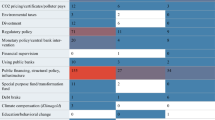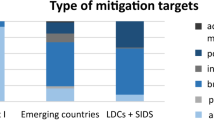Abstract
Everywhere the call is out for `stakeholder’ involvement as a means for improving developmental decisions, particularly those involving complex technology, uncertain risks and contending values. Everywhere but in funds management, it would seem. Despite the presence of obligations under policy instruments such as the Kyoto Protocol (KP), funds management sectors around the world (comprising pooled investment schemes such as hedge funds, pension funds, insurance companies and mutual funds) have been excluded from ecological crisis management discussions. Moreover, the interests of the ultimate beneficiaries of these fiduciary vehicles have not been factored in climate change discussions (Lohmann 2008: 362) and have not participated to any material extent in the mechanisms of the United Nations Framework Convention on Climate Control (UNFCCC).
Access this chapter
Tax calculation will be finalised at checkout
Purchases are for personal use only
Preview
Unable to display preview. Download preview PDF.
Similar content being viewed by others
References
Andonova, L.B. 2010. Public-private partnerships for the earth: politics and patterns of hybrid authority in the multilateral system. Global environmental politics, 10 (2), 25–53.
Andonova, L.B., Betsill, M.M. and Bulkeley, H. 2009. Transnational climate governance. Global environmental politics, 9 (2), 52–73.
Bäckstrand, K. and Lövbrand, E. 2007. Climate governance beyond 2012: competing discourses of green governmentality, ecological modernisation and civic environmentalism. In: M.E. Pettenger, ed. Global environmental governance. Aldershot, UK: Ashgate, 123–149.
Biermann, F. and Gupta, A. 2011. Accountability and legitimacy in earth system governance: a research framework. Ecological economics, 70 (110), 1856–1864.
Blatter, J. 2009. Performing symbolic politics and international environmental regulation: tracing and theorising a causal mechanism beyond regime theory. Global environmental politics, 9 (4), 81–110.
Bowen, A. 2011. Raising climate finance to support developing country action: some economic considerations. Climate policy, 11 (3), 1020–1036.
Cadman, T. 2011. Evaluating the governance of responsible investment institutions: an environmental and social perspective. Journal of sustainable finance and investment, 1 (1), 20–29.
Callon, M. 2009. Civilising markets: carbon trading between in vitro and in vivo experiments. Accounting, organizations and society, 34 (3–4), 535–548.
Clark, G.L. and Hebb, T. 2005. Why should they care? the role of institutional investors in the market for corporate global responsibility. Environment and planning A, 37 (11), 2015–2031.
Fiorino, D.J. 2010. Sustainability as a conceptual focus for public administration. Public administration review, 70, S78-S88.
Foxon, T. and Pearson, P. 2008. Overcoming barriers to innovation and diffusion of cleaner technologies: some features of a sustainable innovation policy regime. Journal of cleaner production, 16(1), S148-S161.
Haigh, M. 2011. Climate policy and financial institutions. Climate policy, 11 (6), 1367–1385.
Haigh, M. and de Graaf, F.J. 2009. The implications of reform-oriented investment for regulation and governance. Critical perspectives on accounting, 20 (3), 319–417.
Haigh, M. and Guthrie, J. 2010. Management practices in Australasian ethical investment products: a role for regulation? Business strategy and the environment, 19 (3), 147–215.
King, A.A. and Lenox, M.J. 2000. Industry Self-regulation without sanctions: the chemical industry’s responsible care program. The academy of management journal, 43 (4), 698–716.
Kym, T. and Kouzmin, A. 2009. Cyberpunk-web 1.0 ‘egoism’ greets group-web 2.0 ‘narcissism’: convergence, consumption, and surveillance in the digital divide. Administrative theory and praxis, 30 (3), 299–323.
Lohmann, L. 2008. Carbon trading, climate justice and the production of ignorance: ten examples. Development, 51, 359–365.
Lund, P.D. 2007. Effectiveness of policy measures in transforming the energy system. Energy policy, 35, 627–639.
Marres, N. 2011. The costs of public involvement: everyday devices of carbon accounting and the materialisation of participation. Economy and society, 40 (4), 510–533.
Prakash, A. and Potoski, M. 2005. Racing to the bottom? trade, environmental governance, and ISO 14001. American journal of political science, 50 (2), 350–364.
Richardson, B.J. 2011. From fiduciary duties to fiduciary relationships for socially responsible investing: responding to the will of beneficiaries. Journal of Sustainable Finance & Investment, 1 (1), 5–19.
Robertson, P.J. and Choi, T. 2010. Ecological governance: organizing principles for an emerging era. Public administration review, Special Issue, S89–S99.
Schnaiberg, A. 1980. The environment: from surplus to scarcity. New York, NY: Oxford University Press.
Zadek, S. 2011. Beyond climate finance: from accountability to productivity in addressing the climate challenge. Climate policy, 11 (3), 1058–1068.
Editor information
Editors and Affiliations
Copyright information
© 2013 Matthew Haigh
About this chapter
Cite this chapter
Haigh, M. (2013). Stakeholders in Climate Policy Instruments: What Role for Financial Institutions?. In: Cadman, T. (eds) Climate Change and Global Policy Regimes. International Political Economy. Palgrave Macmillan, London. https://doi.org/10.1057/9781137006127_8
Download citation
DOI: https://doi.org/10.1057/9781137006127_8
Publisher Name: Palgrave Macmillan, London
Print ISBN: 978-1-349-43493-0
Online ISBN: 978-1-137-00612-7
eBook Packages: Palgrave Political & Intern. Studies CollectionPolitical Science and International Studies (R0)




